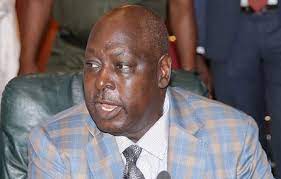How Babachir Lawal, Some Christian Clerics Demarketed Peter Obi In the Muslim North
By Haruna Mohammed Salisu
Peter Obi is a disruptor in Nigeria’s upcoming elections. His aggressive movement has permeated nooks and crannies, particularly with the youth. However, many argue that his movement does not embody any ideological shift, driven by ideas and the desire for nation-building. Despite its inadequacies, Nigerian youths have embraced it within a short period of time, giving it an immediate national outlook and at least symbolically presenting it as a third force which presumably should serve as an alternative movement. Unfortunately, what seemed like a decent movement from the beginning was later hijacked and demarketed by ethnic champions and religious bigots.
Babachir David Lawal, a former Secretary to the Government of the Federation (SGF) who was sacked from his position following allegations of corruption, has been at the forefront of demarketing Peter Obi. Lawal’s recent actions and statements have done more harm than good for Peter Obi’s campaign, particularly in Northern Nigeria. Lawal’s toxic rhetoric and scaremongering have created a narrative that pitched Peter Obi against Muslims, thereby demarketing him in the eyes of many Muslim voters.
Lawal’s rhetoric has made it seem as though a vote for Peter Obi is a vote against Muslims. He has already created a sense of alienation against Muslim voters in many ways. His appeal to emotions rather than facts has fueled tension and sharpened divisions, but more significantly, it has crippled a movement that is struggling to permeate down to the grassroots.
Babachir Lawal’s recent characterization of the Fulani ethnic group has further fueled hatred for Peter Obi among Muslim voters in the north. The Fulani ethnic group, which is primarily Muslim, has been the subject of controversy and scrutiny in recent years, particularly due to the ongoing conflict between herders and farmers in different parts of the country. The conflict has resulted in the loss of lives and property, and it has also created a sense of tension and division among members of different ethnic and religious groups. Instead of building frontiers of love and a sense of belonging for other tribes and religions to embrace the Obi movement, Lawal’s remarks and actions only serve to deepen existing divisions and tensions—and ultimately demarket his candidate in the Muslim north– and quite frankly, he has succeeded in doing so.
Read Also:
But Mr Babachir isn’t alone in demarketing Peter Obi in the Muslims North. A recent video I watched on social media quoted a Christian Religious cleric as arguing that a vote for Peter Obi is a vote to defend Christianity. This is certainly a bad PR for Peter Obi. And many of them do that openly, instead of healing wounds and convincing fellow Muslims that Peter Obi stands for equity, fairness and justice. These guys have succeeded in creating more enemies for him, and certainly, Muslim voters will head to the polls on Saturday and ensure Peter Obi did not win. Thanks to toxic rhetoric and bad PR.
The involvement of religious clerics in Nigeria’s political space, particularly in the run-up to elections, has often been characterized by divisive and toxic rhetoric that fuels ethnic and religious tensions in the country. Rather than marketing Mr. Obi based on competence, integrity, and vision for the country, the clerics are also succeeding in pitching Obi against the Muslim north. Their endorsement of Mr. Obi using the kinds of narratives they utter has created a sense of victimization among members of the Muslim north who feel that they are unfairly targeted or demonized by the other religious group.
Religion is one of the major fault lines in Nigeria’s electoral politics. The country is roughly divided between the Christian South and the Muslim North, and politicians often exploit these fault lines to win elections. Some Christian clerics used their pulpits to demonize Muslim candidates and encouraged their congregants to vote for Christian candidates during elections. Similarly, some Muslim clerics used their sermons to demonize Christian candidates and encouraged their congregants to vote for Muslim candidates. This kind of identity politics can create a sense of division and intolerance among members of different religious groups, leading to violence and instability.
Ethnic chauvinism is another issue that mars Nigeria’s electoral politics. The country is home to over 250 ethnic groups, and politicians often exploit these fault lines to win elections. During the 2015 presidential election, some politicians used inflammatory language that demonized members of other ethnic groups, leading to violence and unrest in some parts of the country.
The use of identity politics and ethnic chauvinism in Nigeria’s electoral politics can lead to a sense of exclusion and alienation among members of certain religious or ethnic groups. This can lead to a lack of trust in the electoral process, as some people may feel that their votes do not count or that they are not represented in the political process.
It is crucial to address these issues in Nigeria’s electoral politics to ensure that the country can move forward and achieve its full potential. Politicians and religious leaders should refrain from using divisive language that can fuel ethnic and religious tensions in the country. Instead, they should focus on promoting unity and inclusive governance that can benefit all Nigerians regardless of their ethnic or religious background.
*Haruna is a commentator based in Nigeria’s northeastern Bauchi State*
















